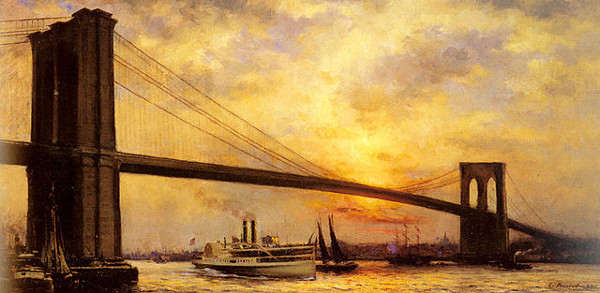
“I would rather be the man who bought the Brooklyn Bridge than the one who sold it.” — Will Rogers

“I would rather be the man who bought the Brooklyn Bridge than the one who sold it.” — Will Rogers

A puzzle by S. Sefibekov:
Winnie-the-Pooh and Piglet set out to visit one another. They leave their houses at the same time and walk along the same road. But Piglet is absorbed in counting the birds overhead, and Winnie-the-Pooh is composing a new “hum,” so they pass one another without noticing. One minute after the meeting, Winnie-the-Pooh is at Piglet’s house, and 4 minutes after the meeting Piglet is at Winnie-the-Pooh’s. How long has each of them walked?
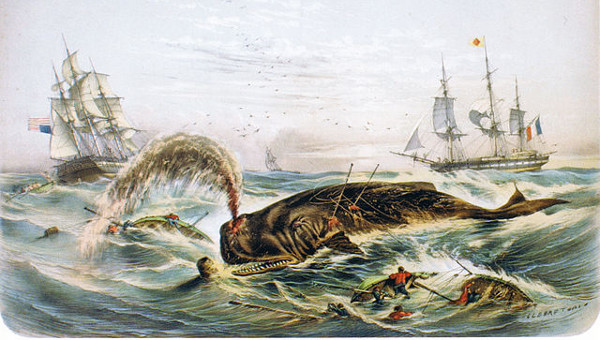
In 1820, the Nantucket whaleship Essex was attacked and sunk by an 85-foot sperm whale in the South Pacific, a thousand miles from land. In this episode of the Futility Closet podcast we’ll tell the story of the attack, which left 20 men to undertake an impossible journey to South America in three small whaleboats.
We’ll also learn about an Australian athlete who shipped himself across the world in a box in 1964 and puzzle over an international traveler’s impressive feat of navigation.
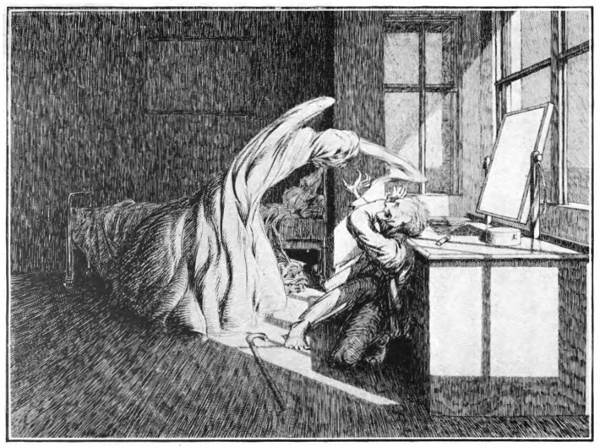
When M.R. James’ Ghost Stories of an Antiquary appeared in 1904, readers were puzzled to find that it contained only four illustrations, an odd number for a book of eight stories. In the preface, James explained that he’d assembled the collection at the suggestion of a friend who had offered to illustrate it but was “taken away” unexpectedly after completing only four pictures.
The friend was James McBryde, a student whom James had met in 1893 at King’s College, Cambridge, where James was dean. The two quickly became close, and McBryde was one of the select few to whom James would read a new ghost story each Christmas by the light of a single candle. They remained close after McBryde left Cambridge, traveling together each year to Denmark and Sweden, and eventually they appointed to work together to publish the ghost stories, which now numbered enough for a collection.
In May 1904 McBryde wrote, “I don’t think I have ever done anything I liked better than illustrating your stories. To begin with I sat down and learned advanced perspective and the laws of shadows …” Regarding the collection’s crowning horror, “Oh, Whistle, and I’ll Come to You, My Lad,” he wrote, “I have finished the Whistle ghost … I covered yards of paper to put in the moon shadows correctly and it is certainly the best thing I have ever drawn.”
Alas, McBryde died only a month later of complications following an appendix operation. James was adamant that no replacement be found, and Ghost Stories of an Antiquary was published with only four illustrations as a tribute to his friend. “Those who knew the artist will understand how much I wished to give a permanent form even to a fragment of his work,” he wrote. “Others will appreciate the fact that here a remembrance is made of one in whom many friendships centred.”
Of the true depth of their friendship, the full story will never be known. James picked roses, lilac, and honeysuckle from the Fellows Garden at King’s College and carried them with him on the train to McBryde’s funeral in Lancashire, where he dropped them into the grave after the other mourners had left. He remained friends with McBryde’s wife and legal guardian of his daughter, and he arranged for the posthumous publication of McBryde’s children’s book The Story of a Troll Hunt. In the introduction he wrote, “The intercourse of eleven years, — of late, minutely recalled, — has left no single act or word of his which I could choose to forget.”

Hamlet’s nunnery soliloquy in “Americanese,” by critic and satirist A.E. Wilson:
To quit or not to quit; that’s what I’m up against
Ought I to stick the darn thing out
And let old man Fortune make a monkey of me
Or take a crack against this brand of bellyaches
And swipe the lot of them? To pass out; to sleep
No more; and by a sleep to say we end
The katzenjammer and all the other things that give us the willies.
I’ll tell the world it would be better. To pass out; to hit the hay;
To hit the hay; perhaps to dream: Gee! that would be tough;
For while we’re sleeping in the boneyard what dreams may come when we have handed in our cheques,
That makes you think: There’s the respect
That makes your life just one long tough break
For who would stand for a kick in the pants or a sock in the jaw
The panning of some ritzy guy
The pain in the neck when some frail has given you the icy mitt
When he might stage a fade out with a bare rib tickler …
From Gordon Snell, The Book of Theatre Quotes, 1982. I’m not sure when Wilson wrote it — to judge from some of the expressions, I think it might be from the 1930s.
08/26/2015 Reader Ed Kitson sent some similar pieces: an Australian ancestor from 1917, travesties from 1810 and 1849, and an 1822 ditty. The mother of all parodies is still the Skinhead Hamlet, mentioned here in 2012 and still stupendously NSFW.
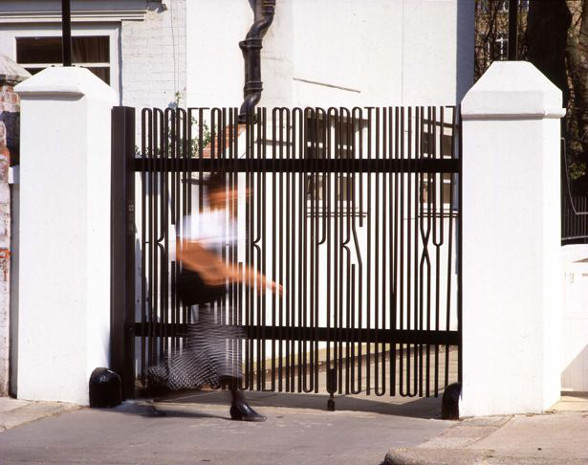
These metal gates, installed at designer Alan Fletcher’s West London studio in 1990, invite a double-take: The railings are formed from the letters of the alphabet, adapted from a condensed wood typeface of the late 19th century. The letters are mounted on two pairs of extended hinges, with the base of the Q forming the gate stop.
Reportedly local police used the gates as a landmark in orienting new recruits to the area.

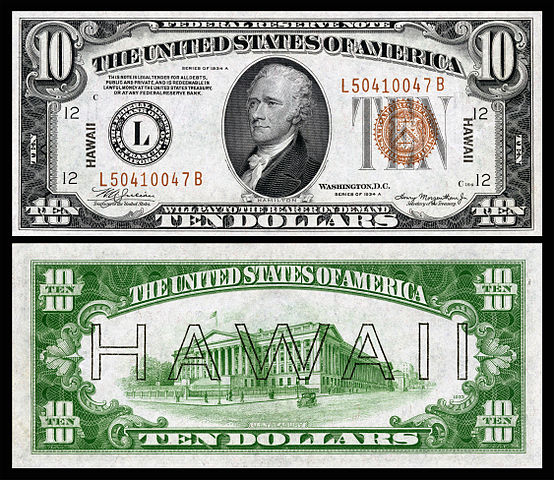
After the Japanese attack on Pearl Harbor in 1941, war planners recognized a special threat: If Japan invaded Hawaii, it could seize millions of dollars in U.S. currency from the islands’ people and businesses — currency that would remain valuable since it was indistinguishable from that on the mainland.
They came up with a novel solution: In January 1942 the government recalled all regular paper money on the islands, except for an allowance of $200 per individual and $500 per business. Then it issued new notes stamped with the word HAWAII. Now if Hawaii fell to Japan these “overprinted” notes could be declared worthless.
After the new notes were distributed, citizens were asked to trade in their remaining regular currency. Two hundred million dollars was burned, and between August 1942 and October 1944 Hawaiians were required to conduct their business using the overprinted notes.
Happily, the invasion never came, and after the war the Hawaiian notes were exchanged for regular currency again. Today they’re collectors’ items.
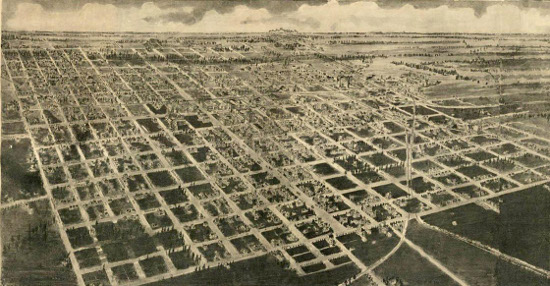
In the 1890s, touched by Georgia’s generosity in sending supplies to a drought-ridden Midwest, Indianapolis attorney and Union veteran Philander H. Fitzgerald contacted Georgia governor William J. Northen and described a dream he had of a colony in the warm South where Northern veterans might spend their final years. They established a new town, called Fitzgerald, on a parcel of public property only 10 miles from the site of Jefferson Davis’ capture and not far from Andersonville, the location of the Confederacy’s most notorious prison.
The first 50,000 acres sold quickly, and another 50,000 were soon sought. Formally founded in 1895, the town largely fulfilled its namesake’s vision of reconciliation and comity. The town was open to “all good people,” but the overwhelming majority of its first residents were Union veterans. Planners named seven streets in the west of town after Confederate generals such as Lee and Jackson and seven streets in the east after Union leaders such as Grant and Meade. Children hailing from 38 states received free tuition from free textbooks in the first schools in Georgia to offer a nine-month term, and only one of their 12 teachers was a Southerner. By 1900 Fitzgerald had 9,000 residents and was celebrating two Memorial Days, Georgia’s on April 26 and the national holiday on May 30, unusual in the South before World War I.
The town’s first hotel was called Grant-Lee. After some grumblings among the neighbors, they changed it to Lee-Grant. Nobody’s perfect.
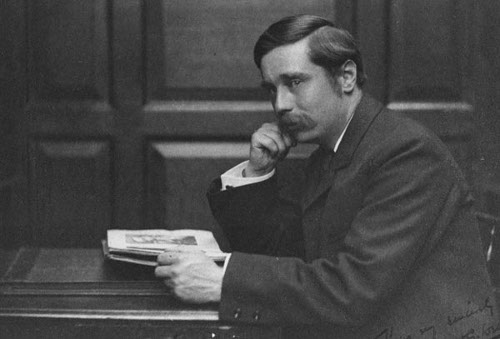
In 1888, as he began work on a new story called “The Chronic Argonauts,” H.G. Wells drew up an account of his literary successes to date:
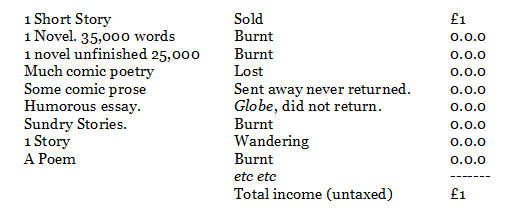
“Some day I shall succeed, I really believe,” he wrote, “but it is a weary game.”

Meteors are more commonly seen between midnight and dawn than between dusk and midnight. Why?